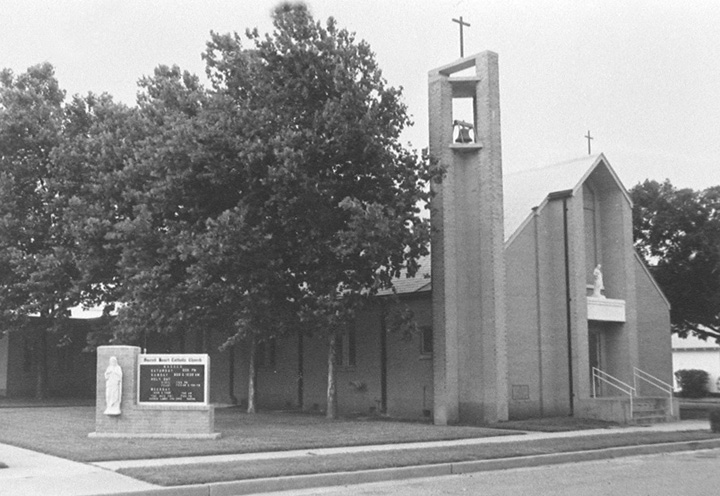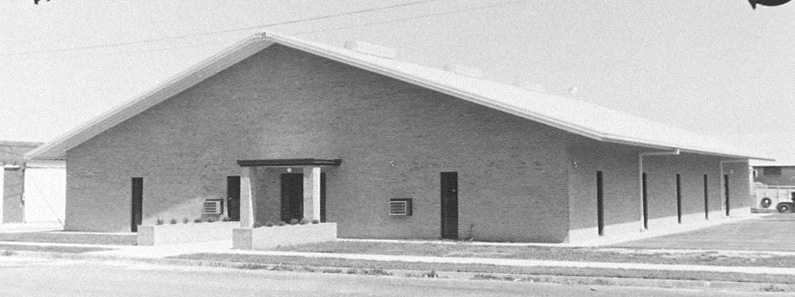| The
first church building was erected in
Coleman County in 1882. The
dimensions of this wood frame building
were 30 feet by 45 feet. Years
later the building was lengthened to
57 feet. Located at 201 San
Saba Street in Coleman, it served as a
community church where all faiths
went to worship. The property
was Lot 3 and the west ½ of
Lot 2, Block 10 in the townsite of
Coleman.
Reverend
William
B. Bloyes came to Coleman as a
minister of the Northern
Presbyterian
Church and offered services first in
the old “rawhide” lumber courthouse
and later on the second floor (which
was the Masonic Hall) of the present
Bowen Drug Store. Later that
same year the Reverend Bloyes and
the
Presbyterians acquired the new
church building at 201 San Saba
Street.
On
October 30, 1890, the following five
men: M. M. (Marion M.) Callan, Fred
Studer, Mike Bolan, James J. Callan
and J. P. Lynn, spent $300.00 and
bought
for the Catholic Church Lot 4 and
the west ½ of Lot 5, Block 10.
This property was just south and
adjacent to the Presbyterian Church
and
is the property on which the new
Sacred Heart Church stands today, at
the
corner of East College Avenue and
San Saba Streets. For some 69
years,
Lot 4 and the west ½ of Lot 5 in
Block 10 was vested in the trustees,
before being deeded to Bishop
Reicher of the Diocese of Austin, in
which
Coleman was located at the time.
After
the purchase of this property there
was still no Catholic Church in
Coleman.
Then, on December 28, 1892, the
Catholics of Coleman, under the
leadership
of Mr. F. Beck, bought the original
wood frame building from the
Presbyterians
in the name of the Most Reverend T.
F. Brennan, Bishop of Dallas, within
whose territory Coleman was at the
time. The deed was signed by
W.
O. Reed and R. S. Bowen, Trustees of
First Presbyterian Church.
Although
the Catholics of Coleman now had a
church, there was no resident priest
to serve the congregation until
1950.
At
first, masses in Coleman were
offered in the Callan family
home.
The old bureau desk was used for the
altar of sacrifice. A
cherished
heirloom, it has passed down to
succeeding generations in the Callan
family.
Before 1910, priests would come
occasionally from Dallas to offer
mass
and administer the sacraments in
Coleman and nearby
settlements.
Also priests stationed in Brownwood
would stop at Coleman to administer
the sacraments when on their way to
Ballinger for services. During
those first years mass was offered
in Coleman about once a month.
After 1910, the priests in Ballinger
took care of the Coleman parish,
first
traveling by train once a
month. After the advent of the
automobile,
starting in the late twenties, the
priests traveled from Ballinger to
Coleman
by car each Sunday.
The
following priests who served the
parish from St. Mary’s in Ballinger,
all
Oblates (O. M. I.), were: J. B.
Frigoux, 1910-1913; Leo F. Lavoie,
1913-1914;
Gustav Gollbach, 1914-1923; J. A.
Sirois, 1923-1927; Henry M. Janvier,
1927-1937; T. Fernandez, 1937-1938;
A. J. Faillon, 1938-1941; F. X.
Cagnon,
1941-1941; H. A. Seitters,
1941-1942; Edward B. Postert,
1942-1950; and
Michael Slattery, 1949-1950. Father
Slattery was assistant Pastor with
Father Postert. In 1950, the
Oblate Fathers relinquished care of
Sacred Heart Church. His
Excellency, Bishop Reicher of
Austin, assigned
the church to the care of the
Benedictine Fathers, who resided in
Coleman.
The Parish had its first resident
pastor. The Benedictine
Fathers
cared for the parish until
1954. They were: Leonard Van
Ackeren,
O.S.B., 1950-1952 and William Vonk,
O.S.B., 1952-1954.
In
November of 1954, the parish
received its first Diocesan priest,
when Father
Steve Montenegro was appointed as
resident pastor. Segregation
existed
in the parish for many years.
Anglos were seated in front of the
church and Hispanics in the rear,
until the coming of Father
Montenegro.
In 1927, a Father Diego gave a
mission to the Hispanic people of
the parish.
Only then were many of them prepared
through instructions to receive the
Sacraments.
In
1923, further additions were made to
the wooden church frame
building.
A kitchen, bedroom and bath were
added to the rear of the
building.
Visiting priests would use these
quarters as they sometimes stayed
overnight
in Coleman. Augustin Ramirez
was the custodian who took care of
the
premises at that time, and he was
given the small wooden crucifix
originally
used on the altar.
A
Catholic Chapel was built in Santa
Anna in 1914 and named St. Patrick
Church.
Prior to that time, mass was offered
occasionally in the home of the
Mahoney
family in Santa Anna. In 1941,
the church in Santa Anna was moved
to Brownwood. Since then
Catholics in Santa Anna have
attended mass
and services in Coleman.
However, in 1949, Father Slattery
came from
Ballinger once a month to offer mass
in Santa Anna in a private home
belonging
to Nestor De Leon.
In
April of 1957, while still remaining
under the title of a parish, Sacred
Heart came under the care of the
Diocesan priests in Brownwood.
Father
Leopold Bujnowski, pastor of St.
Mary’s in Brownwood, together with
his
assistant pastors, took change of
the parish. It was under
Father
Leo’s administration that plans for
a new church were formulated.
The assistant pastors who helped
care for Sacred Heart were Fathers
B.
Mahoney and Benedict Zientek.
On
June 15, 1958, in the Centennial
Year of Coleman County, ground was
broken
for the construction of the new
Sacred Heart Church.
Construction
began on June 17, 1958 and the
church was completed in February of
1959.
It was formally dedicated the
following month by the Most Reverend
L. J.
Reicher, Bishop of Austin. The
Catholic Church Extension Society
gave a grant toward the construction
of the church. The Building
Committee members who helped plan
the church were: M. J. Brannon,
Eldon
Knox, J. F. Hanke, Hunter Woodruff
and Santos Mendoza.
The
new Sacred Heart Church is of
contemporary design and seats
236.
The rectory is an integral part of
the building and is situated across
the rear of the church
building. The building is
constructed of face
brick for the exterior walls,
trimmed with natural stone and with
exposed
face brick in the nave and plaster
finish in the rectory. Roof of
the church is supported by exposed
wooden arches with the wood roof
deck
exposed in the nave. Floors of the
church are terrazzo while the
rectory
floors are of oak. Windows are
of steel with opalescent glass in
the church and clear glass in the
rectory. Wainscot in the nave
is
of oak and projects from the main
wall so as to conceal the heating
ducts.
Roof of the church is of asbestos
shingles while the rectory roof is
tar
and gravel. The tower contains
a bell operated by an electric bell
ringer. After the completion
of the new church, Father Benedict
Zientek,
assistant pastor of St. Marys in
Brownwood, came to live in Coleman
and
take care of the parish.
Sacred
Heart Church has been, in the course
of its history, within three
Dioceses.
From its first years until November
29, 1947, it was in the Diocese of
Dallas; in the Diocese of Austin
until October 16, 1961, when Coleman
County
became territory of the newly
created Diocese of San Angelo.
Until
this time. Sacred Heart Church in
Coleman had not been canonically
erected
as a parish. Therefore, on
March 20. 1962. Bishop Thomas
J.
Drury of San Angelo canonically
created the Parish of Sacred Heart
at Coleman,
having as its boundaries all the
County of Coleman. The following
month,
on April 1, Bishop Drury appointed
the Reverend Leopold Bujnowski as
pastor.
Father Leo remained as pastor until
1970. He was followed by: Leo
Diersing, 1970-1977; John Waldron,
1977-1978; Louis Moeller, 1978-1979;
John Pierce, 1979-1979 and Lawrence
Cyr, C.P,P.S., 1979 to the
present.
During the pastomate of Father
Diersing the debt was paid off on
October
1, 1974.
In
1980, plans were formulated by
Father Cyr and the parishioners for
the
building of a new parish hall to
replace the old frame structure
originally
built in 1882, and which had served
as the church for so many
years.
After the new church was built the
old was converted for use as a
parish
hall in 1959. Because of the
condition of the wood frame
building,
it was deemed inadvisable to try to
renovate it and it was torn down to
make way for the new
structure. Groundbreaking for
the new Parish
Hall took place on December 5,
1981. The building Committee
members
who helped plan the structure with
Father Cyr were: Santos Mendoza, Sr.
(Chairman), James Hausenfluke, Joe
Hanke, Jr., Chris Knox and Raymond
De
Leon. Before the completion of
the building, Anna Kleman replaced
Raymond De Leon on the
committee. Construction was
begun in February
of 1982. The building was
dedicated by Bishop Fiorenza of San
Angelo
on June 6, and completed in August
of that same year. The
Catholic
Church Extension Society gave a
grant of $15,000.00 toward the
completion
of the project. The new Parish
Hall is located on Lot 3 and the
west
½ of Lot 2, Block 10 at 201 San Saba
Street. It measures 70
feet by 100 feet and is basically a
steel building faced with brick,
matching
the church. It contains a
social center, five classrooms, an
office,
a large storeroom, a large well
equipped kitchen and two rest rooms
with
showers.
The
Stations of the Cross were erected
in the original church but were
transferred
to the new church in 1959.
They were originally plain white
stations,
but before being placed in the new
church they were painted by Sherold
Carville in the colors they have
today.
Approximately
150
families are registered as members
of Sacred Heart Church, of whom
75% are Hispanic and 25% Anglo.
--------------------------------------------------------------------------------

Sacred
Heart Catholic Church - 1959

Sacred Heart Catholic Church Hall -
1982
|